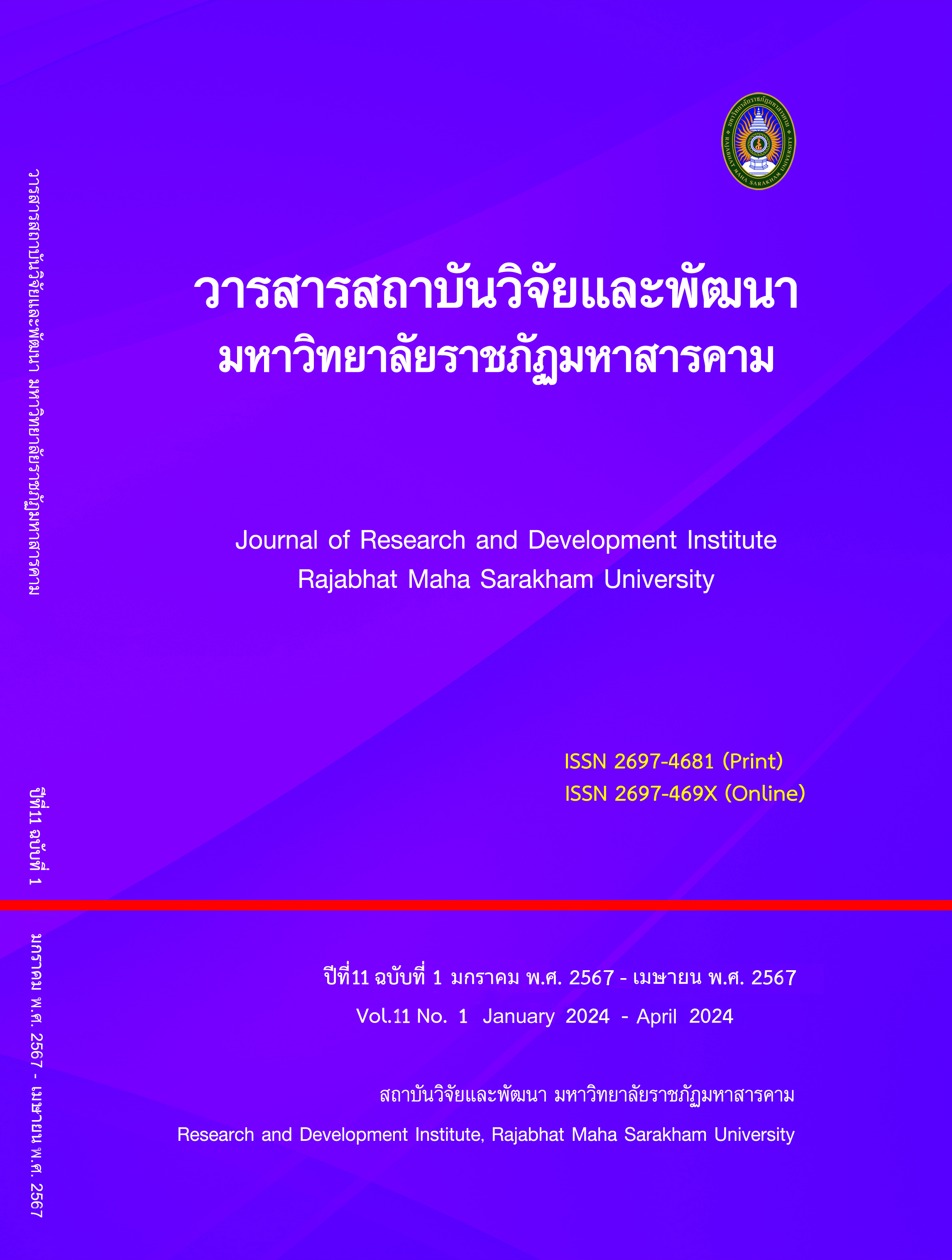Development of the Teacher Leadership Model of Nonthun Municipal School Department of Education Khon Kaen Municipality
Keywords:
Development Model, Teacher LeadershipAbstract
The purposes of this research were to: 1) study the components of leadership teacher 2) study the current condition and the desirable conditions of the teacher leadership 3) establish and develop a model for developing teacher leadership 4) study the effect of the develop teacher leadership model performed in 4 phases Phase 1: Study the components of collaborative teacher leadership by means of group discussion with experts and assessment; Phase 2: study the current and the desirable conditions of the teacher leadership with the sample of this research was the Municipal School teachers, comprised 248 people; Phase 3: establish and develop the teacher leadership model, and evaluate by the expert; Phase 4: applying the developed teacher leadership to 38 teachers of Nonthun Municipal School. The research instruments included tests, assessment forms, questionnaires, and interview forms. Statistics used in the research were percentage, mean, and standard deviation.
The results of the research were: 1. The components of teacher leadership have 5 components: 1) shared vision 2) teacher as change agent 3) team building 4) curriculum development and implementation 5) learning process 2. Study of the current and desirable conditions of the teacher leadership reveal the overall current at the high level. The statistical significance of the needs level of 0.24. 3.To establish and develop a model for developing teacher leadership; confirming the development model with 5 experts of the connoisseurship 1. Introduction 2. Details of methods: 1) workshops 2) practice 3) study tours 4) PLC 5) Supervision, supervision, monitoring 3. Tools 4. Conditions 5. Studying the results of using the model, it was found that scores after development were significantly higher than before at .05 level and 70percent of everyone passed the criteria. The results of teacher leadership measurement after the development were higher than before the development at the .05 level. Results of the evaluation of those who received the development. Overall, it is at a high level in every aspect. it is at the highest level.
Keywords: Development Model, Teacher Leadership
References
Ratchapat, A. (2011). Development of leadership indicators for teachers in basic educational institutions. Khon Kaen: Khon Kaen University.
Wattanasaksiri. C. (2018). Strategic leadership development of department heads in Rajamangala University of Technology. Maha Sarakham : Maha Sarakham University.
Douglas, A.R. and Emily Truelove. (2011). The Power of Collective Ambition. Harvard Business Review, form the December, 89(12), 94-102.
Hiller, N.J., Day, D.V. and R.J. Vance. (2006). Collective enactment of leadership rolesand team effectiveness : A field study. Leadership Quarterly, 17(4), 387-397.
Judge, T.A. and R.F Piccolo. (2004). Transformational and transactional leadership : Ameta-analytic test of their relative validity. Journal of Applied Psychology,18(4), 589-598.
Thongsuk, K. (2017). Development of a program to enhance ethical leadership of school administrators under the Office of the Basic Education Commission. Maha Sarakham : Maha Sarakham University.
Pharnphob, N. (2010). Study of teachers' needs regarding leadership characteristics of administrators. Private Kindergarten Under the Office of the Private Education Commission Nakhon Si Thammarat Province. Bangkok : Srinakharinwirot University.
Office of the Basic Education Commission. (2013). Policy of the Office of the Basic Education Commission, fiscal year 2014. Bangkok: Office of the Basic Education Commission.
Kuenkel, P. and Schaefer, K. (2016). The Art Of Leading Collective–Co–Creating A Sustainable, Socially Just Future. Germany : Potsdam.
Chatchawapantha, P. (2016). Development of a program to strengthen leadership. Strategic leadership of secondary school administrators. Maha Sarakham : Maha Sarakham University.
Thonglao, P. (2010). Participatory action research for development. System for enhancing teachers' leadership in learning management According to the philosophy of Sufficiency Economy. Sakon Nakhon : Sakon Nakhon Rajabhat University.
Wasi, P. (2014). Leadership creation system for modern Thailand. Mahidol University Bangkok: Center for Contemplative Education.
Ronald W Rebore. (2000). Human resources administration in education a management approach (6th ed). Boston: Allyn And Bacon.
Absuwan, S. (2013). Indicators of collaborative leadership among primary school administrators. Khon Kaen, Khon Kaen University.
Julsuwan, S. (2011). Developing leadership for change in administrators supporting government higher education institutions. Maha Sarakham : Maha Sarakham University.
Yordsala, S. (2013). Developing visionary leadership of primary school administrators under the Office of the Basic Education Commission. Maha Sarakham : Maha Sarakham University.
Chaiyamaha, T. (2013). Model for developing teacher leadership in learning management. Secondary school Under the Provincial Administrative Organization in the Northeast. Sakon Nakhon : Sakon Nakhon Rajabhat University.
Pakika. W. (2017). Developing a program to strengthen leadership. The creative leadership of school administrators. Maha Sarakham : Maha Sarakham University.
Wannakam, W. (2010). Development of professional competencies of administrators of small educational institutions under the Office of the Basic Education Commission. Nakhon Ratchasima : Nakhon Ratchasima Rajabhat University.
Chankaew, W. (2012). Model for developing creative leadership of school administrators under the Surat Thani Primary Educational Service Area Office, Area 3. Bangkok : Rangsit University.
Chansiri. W. (2008). Development of core competencies of support administrators in public universities. Maha Sarakham : Maha Sarakham University.
Mungnaklang, W. (2013). Teacher leadership development model in small educational institutions. Under the Office of the Basic Education Commission in Government Inspection Area 11. Sakon Nakhon: Sakon Nakhon Rajabhat University.
Sutakot. Y. (2010). Leadership development of municipal employees: the case of municipal offices. Mukdahan city. Sakon Nakhon : Sakon Nakhon Rajabhat University.
Downloads
Published
How to Cite
Issue
Section
License
Copyright (c) 2024 วรวุฒิ อันปัญญา

This work is licensed under a Creative Commons Attribution-NonCommercial-NoDerivatives 4.0 International License.
Articles that are published are copyrighted by the authors of the articles







